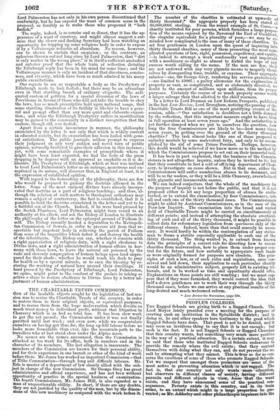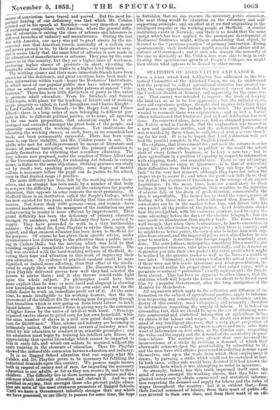PEOPLE'S COLLEGES.
TEE Ragged Schools are giving birth to a Ragged Church. The Lord Mayor lately presided over a meeting or the purpose of erecting such an institution in the Spitalfields district ; and in doing so, he and other speakers bore testimony to the good which Ragged Schools have done. That good is not to be denied, and it may seem an invidious thing to say that it is not enough; but such is the fact. It is not Ragged Schools or Ragged Churches that this country wants, but something very much more -positive in the way of a practical education. To a certain extent, it may be said that those who instituted Ragged Schools endeavour to provide the remedy where the evil exists ; that they content themselves with doing what they can, and do not prevent the re- salt by attempting what they cannot. This is true so far as con- cerns the exertions of some of those who promote Ragged Schools. Yet we suspect that amongst these promoters are some of the most active in preventing education which is not ragged. The fact is, that our country not only wants more edutation, but observers in different classes of society, having different pursuits and different objects in view, know that the want exists, and they have announced -some of the practical con- sequences. Poverty exists in this country, and in its train crime, to an ,extent which might in a large proportion be pre- vented; as Mr. Adderleyand.other philanthropic inquirers into the causes of convictism have traced and proved. But the most im- portant bearing of our deficiency was that which Mr. Cobden pointed out in his speech at Barnsley—oar very imperfect means of sustaining competition with America, where the general diffu- sion sion of education is raising the class of artisans and labourers in different branches of industry and manufactures. During the last war with America, our navy was put to great straits by the un- expected fact that American vessels nominally of a certain size and power proved to be, by their structure, very superior to ours and it seems likely that the same kind of advance is now made in the education of manufacturers or artisans. They pass by the same names as in this country, but they are a higher class of workmen, producing higher classes of products—in short, elevating the
nominally similar American trades to a higher level than ours. The working classes and their more immediate friends have been Conscious of the deficiency, and great exertions have been made to place information within reach : hence the Mechanics' Institutions, in which most of our popular public men have taken some part, either as actual promoters or as public patrons at annual "cele- brations." There has been little distinction of party in this union to promote adult education. From Dr. Birkbeck and Samuel Wilderspin, with plans for the teaching of infants and of working people properly so called, to Lord Brougham and Charles Knight— to Lord Carlisle and Mr. Disraeli—to Mr. He5ry Cole and Prince Albert—there is a long series of men belonging to different pur- suits in life, to different political parties, or to none, all agreeing in the one main proposition, that education ought to be en- couraged and extended amongst the great body of the people, and especially amongst the working classes. Yet institutions for educating the working classes, as such, have, as we remarked last week, not been permanently successful. There has been some cause to sap their stability, and Mr. Cobden points it out. The adults who met for self-improvement by means of literature and classes of mutual instruction wanted the primary education to qualify themselves for obtaining that secondary education. The very scheme now proposed, under the sanction of Prince Albert and of the Government generally, for extending Art Schools in various forms, is liable to the same objections. Striking geniuses can study art by itself ; but, speaking generally, some degree of mental culture is necessary before the pupil can do justice to his school, even in that limited range of practice.
The same difficulty has been felt by the working classes them- selves, and an attempt has been made by a number of that body to conquer the diffioulty. Amongst all the enterprises for popular education, this appears in some respects the most promising. At Sheffield there is an institution called the People's College, which has now existed for five years, and during that time attained some success. Not fewer than 2500 persons—men and women—have received instruction ; and the managers of the institution are now endeavouring to render it more efficient by improvement. Their grand difficulty has been the deficiency of primary education amongst its members, and that deficiency they have resolved to supply. They have proceeded to work in a very businesslike manner : they asked Dr. Lyon Playfair to advise them upon the subject, and that eminent educator has been down to Sheffield for the purpose. Of course he has given them specific advice, under circumstances less distracting to the attention than a public meet- ing in Cutlers Hall; but the meeting which was held in that building supplied remarkable testimony to the movement. The hall was crowded with the hard-working artisans of Sheffield, de- voting their time and attention to this work of improving their own education. No evidence of practical candour could be more dignified, or indeed more affecting, than that effort of the unedu- cated to supply their own deficiencies. The discourse which Dr. Lyon Playfair delivered proves how well they had selected the person to advise them ; and it also throws considerable light upon the whole subject. No philosopher could have been more explicit than he was ; or more lucid and eloquent in showing how knowledge must be sought for its own sake, and not for the selfish desire to work an immediate profit out of it. At the same time, he made intelligible to his working hearers, that the im- provement of the intellect fits the working man for passing through that transition which is now going on from brute labour to intel- ligent labour. Mere muscular force is giving way to the command of higher forces by the union of intellect with hand. "Penelope required twelve slaves to grind corn for her own household, while the same number of slaves in a mill now grind daily enough of corn for 60,000 men." Thus, science and industry are becoming so intimately united, that the practical servant of industry must be fitted by his education to conduct it on scientific principles ; and his education must begin by training his intellect into fitness for appreciating that special knowledge which cannot be imparted to him in early life, and which can seldom be acquired without the early training in the elements of education. Thus Dr. Playfair showed the indissoluble connexion between education and industry. It is no Ragged School education that can supply what Mr.
Cobden and Dr. Playfair prove to be necessary for fulfilling the industrial demands upon this country. We possess ample means, both in respect of money and of men, for imparting the necessary eduction to our adults, so far as they can receive it, and to their children. The difficulty lies in those sectarian prejudices and dis- .8idelloes which interoept education and obstruct it. And we are in saying, that amongst those who prevent public educa- tion are spine of the most strenuous promoters of Ragged Schools.
Until we- a Government infinitely stronger than any which Mre:have, or,ore.likely to possess for some time, the hope is forbidden that we can procure the necessary public education. The next thing would be education on the voluntary and self- supporting principle; and, an effort at it we find originating in the intelligent impulse of the working people at Sheffield. A similar institution exists in Norwich ; and there is no doubt that the same energy which has been applied to the premature development of Mechanics' Institutes might, without abandoning that object, be devoted to the "previous question" of primary instruction. Rising spontaneously, such institutions might receive the advice and as- sistance of Government; and if men who discern the necessity of the ease as distinctly as Mr. Cobden does were also to help in cul- tivating this spontaneous growth of People's Colleges, we might then obtain what appears to be denied by other means.



























 Previous page
Previous page